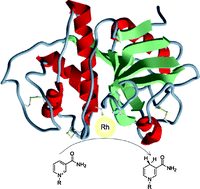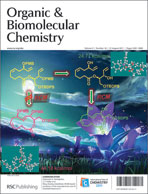Chemically engineered papain as artificial formate dehydrogenase for NAD(P)H regeneration†
Abstract
Organometallic complexes of the general formula [(η6-arene)Ru(N⁁N)Cl]+ and [(η5-Cp*)Rh(N⁁N)Cl]+ where N⁁N is a 2,2′-dipyridylamine (DPA) derivative carrying a thiol-targeted maleimide group, 2,2′-bispyridyl (bpy), 1,10-phenanthroline (phen) or ethylenediamine (en) and arene is benzene, 2-chloro-N-[2-(phenyl)ethyl]acetamide or p-cymene were identified as catalysts for the stereoselective reduction of the enzyme cofactors NAD(P)+ into NAD(P)H with formate as a hydride donor. A thorough comparison of their effectiveness towards NAD+ (expressed as TOF) revealed that the RhIII complexes were much more potent catalysts than the RuII complexes. Within the RuII complex series, both the N⁁N and arene ligands forming the coordination sphere had a noticeable influence on the activity of the complexes. Covalent anchoring of the maleimide-functionalized RuII and RhIII complexes to the cysteine endoproteinase papain yielded hybrid metalloproteins, some of them displaying formate dehydrogenase activity with potentially interesting kinetic parameters.


 Please wait while we load your content...
Please wait while we load your content...